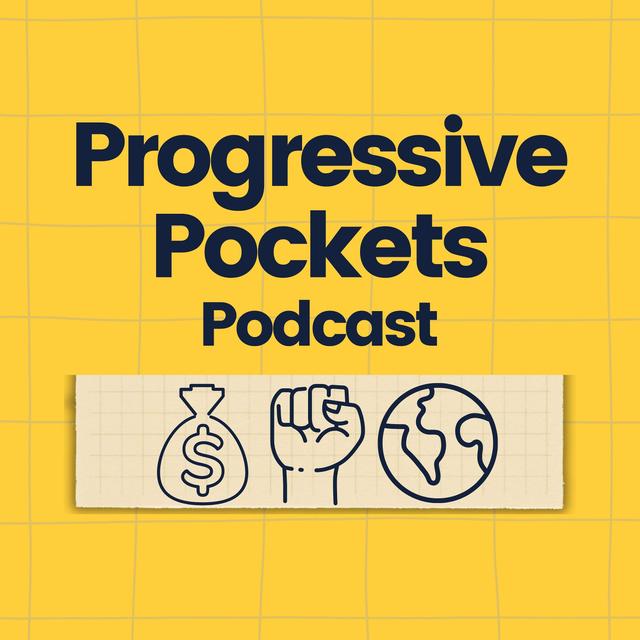Welcome to Progressive Pockets! I go by GG, that’s short for Genet Gimja. This is a show about reclaiming some of our power that I think a lot of us were led to believe we don’t have. I’m talking about our wallets. Where we shop, where we bank, how we invest, how we give, for a long time I think the predominant school of thought has been that our beliefs on climate change and homelessness and gender equity and racial equity are completely separate entities from our money. That billionaires are the only ones with power behind their money. I don’t buy that, if you’re listening, you don’t buy it either.
In the past, there have been lots of episodes on how to think about getting started with socially responsible investing or impact investing, some people call it values aligned investing. I’m talking about taking your societal values into consideration as you invest your money.
I heard Ben Vivari say at a conference once that these corporations are powerful because of our shareholder money, that we are the source of their power and that has really stuck with me as a clear and concise way to highlight the power that we really do have.
We can choose to screen out companies that don’t match our values. We can actively seek out companies who are looking for solutions to the problems our planet and people are experiencing.
But either way, whether you’re screening out bad companies or screening in good ones, and frankly even if you keep your investments right where they are with companies that don’t match your values at all, there’s another source of power. Not just our money as shareholders, but also our voices. Let’s talk about that today….
Shareholder activism is a strategy used by shareholders to influence a company's management and operations. Let’s talk about a few ways that shareholders can exert our influence, outside of just our money:
First, let’s talk about voting in shareholder elections.
When resolutions come up, vote on them. Either directly or if you have a financial planner have them vote on your behalf. This is the primary source of power we have even as small shareholders. You’ll be voting on issues like executive compensation or the board composition or other issues that can really influence a company’s impact on the community and the planet.
So even if you have one share, and you have one vote, make sure you vote.
You can also organize your own voting campaign to influence management decisions. This involves encouraging other shareholders to vote against certain proposals by the board, such as excessive executive pay. Even if these campaigns are not successful, they send a clear message to the management. They pay attention to what happens at these shareholder elections.
Those are direct sources of power, voting and encouraging other shareholders to vote on an issue, attending the annual general meeting.
If you are a shareholder that wants to influence a company’s actions, you can use media channels and social media platforms to publicize demands and gain public support. This strategy can amplify their message and increase pressure on the company. This is why I say that you don’t have to be a huge shareholder with a large percentage of shares to have influence.
I wanted to offer a couple of examples of times when shareholders have made a company change its actions.
In 2021, a majority of Chevron shareholders voted in favor of a proposal to cut emissions from the company's products, despite opposition from the board. This showcased how even smaller shareholders can influence major corporate policies when they work together.
In 2018, I believe it was 2018, a shareholder proposal filed by As You Sow, a non-profit shareholder advocacy group, led Starbucks to commit to phasing out plastic straws globally by 2020. So this is another example of how even small shareholders can drive environmental changes.
After a big scandal in 2017, Wells Fargo shareholders voted against the bank's executive compensation plan. A year later a similar thing happened at Disney with CEO Bob Iger’s compensation plan. The shareholders voted against it.
We can also buy and sell your shares in response to whatever decisions the company is making.
Remember in 2015 when we all found out that Volkswagen installed software in diesel engines to cheat emissions tests? Oh the shareholders noticed. There was a dramatic drop in Volkswagen's stock price, losing about a third of its value in the days after the issue came to light.
Same thing happened in 2018, remember when it was revealed that Cambridge Analytica had harvested data from millions of Facebook users without their consent. Within days the facebook stock price dropped, which wiped out billions of dollars in market value.
So the point with those examples is that even beyond voting on resolutions, just the act of buying and selling our shares can send a message and influence a company’s actions.
To recap, if we are shareholders of a company we have some power. We can vote in their elections, we can attend the annual general meetings, we can organize voting campaigns, we can use social media to amplify our demands.
We can also buy and sell our shares in response to what we want companies to change.
If you have more time today, here’s another episode to check out, that’s episode 51 Activist Investing.
Before you go, please do drop Progressive Pockets a 5 star review. It takes like no time. Please just go to your podcast player app that you’re using right now and click on the 5 stars. Thank you for that.
Let’s end with a quote…
“Fight for the things that you care about, but do it in a way that will lead others to join you.” Ruth Bader Ginsburg
Let’s talk again soon!

